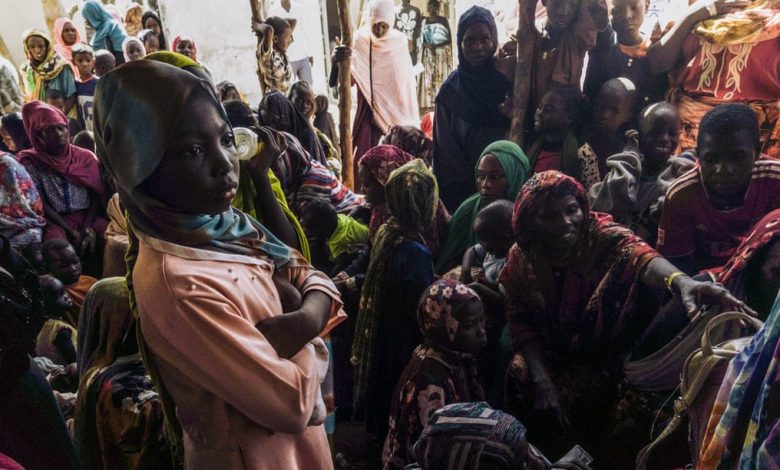Refugees in Chad: RSF commits ethnic cleansing crimes

Agencies – Sudan Events
Raging clashes in Sudan have led thousands of people to flee violence in Darfur, where the international community fears occurrence of ethnic cleansing of refugees in overcrowded camps in the desert in eastern Chad.
Maryam Adam Yahiya (34 years old), sitting on the ground in front of her residence in Adre camp, tries to pacify her hunger by drinking tea made on firewood.
Maryam, a member of the Masalit tribe, crossed the border on foot after a four-day journey, without food, carrying her eight-year-old son on her back. She says that she was forced to leave seven of her other children after an attack by “heavily armed” men on her village, explaining, “What we witnessed in Ardamata was horrific. The Rapid Support Forces killed elderly people and children indiscriminately.”
The story of Maryam and thousands of other stories that refugees tell during their journey, which is exacerbated by the pain of loss, the fatigue of the journey, and the loss of the ability to imagine what hardships the coming days may bring for them.
Refugees flee ethnic cleansing
In the city of Ardamata alone, in Western Darfur, more than a thousand people were killed in early November at the hands of armed groups, according to the European Union. These acts of violence forced more than eight thousand people to flee to neighboring Chad within a week, according to the United Nations.
Western capitals, including Washington, accused “elements of the Rapid Support Forces and militias allied with them of committing crimes against humanity and acts of ethnic cleansing.” The European Union also suspects “ethnic cleansing” in Darfur.
As soon as they arrive at the Wadi border area, refugees gather in camps run by non-governmental organizations, and in other informal camps, where they set up shelters with available materials.
Nearly 500,000 Sudanese refugees are in Chad
Chad, the country located in Central Africa and which is considered the second least developed country in the world, according to the United Nations, hosts the largest number of Sudanese refugees, and their number has reached 484,626 people since the beginning of the war, according to the latest figures released by the United Nations High Commissioner for Refugees.
Hunger is added to the suffering of displacement and the atrocities witnessed by the Sudanese.
Maryam says that since her arrival in Chad with her child, “we have barely found anything to eat.” Also, the lack of water is a source of tension in the camps, which the humanitarian organizations operating there are working to alleviate.
Murder, rape and ongoing violations.
Sitting on a bed in a medical facility run by the non-governmental organization Doctors Without Borders on the outskirts of Adre camp, Amira Khamis (46 years old), a Masalit refugee in Darfur, who lost five of her children, says that the RSF “killed many men and raped the girls.” She added, “They kill (those with sharp, black skin). They used to say that the Tama and the Burqo (two tribes) were with them, but what we saw was that the RSF was the one who killed more.”
She continued, “There were fighting (in El Geneina). After the fighting, we moved to Ardamata, and after we moved to Ardamata, they looted everything… There were fighting in Ardamata, and I was hit by a shell.”
In turn, Muhammad Nour Al-Din (19 years old), with his right arm broken and tied with a bandage around his neck, confirms the continuous persecution by the RSF against the Masalit, saying: “They exterminate all people. If you are a boy they will kill you directly. Our neighbors, who are Arabs, tried to get me out. I passed. “They came with them for a few days. They came and looted the house and did not leave anything in it. We came here with the clothes we were wearing. They did not leave us anything, then we were displaced and came to Chad.”
He added, “We tried to leave the house with the family, but we could not find a way. Then we moved to a school and spent three days there. The Rapid Support or other forces opened fire on us. Four family members died, including my mother, two of my aunts, and my grandfather, and I was wounded along with two others of among my brothers.”
He continued, “We entered the hospital, and they entered the hospital as well and tried to kill all the people. We tried to get out. My mother, aunts, and grandmother and I went out to (another) area where they entered and committed genocide. They made people line up in groups of twenty people and shot them.”
For his part, Gerard O, MSF program coordinator in Adre, considers thatthe situation became worrying with the influx of additional Sudanese refugees. He added that they received those people who were suffering from physical and psychological disturbance, given the fact that the trip to Chad was fraught with danger.
Amir Adam Haroun, a Masalit refugee whose leg was broken by explosive shrapnel, said: “They also attacked us when I was transferred to Chad to receive treatment.”
Issues and people
“Doctors of Sudan”: Health facilities in Wad Madani are out of service
Since April 15, Sudan has been witnessing a war between the army led by Abdel Fattah al-Burhan and the Rapid Support Forces led by Mohammed Hamdan Dagalo.
In Darfur, civilians are subjected to widespread violence, raising United Nations concerns about a new genocide in the region. The war in Sudan resulted in the deaths of 12,000 people, according to a tally by the ACLED organization, which specializes in counting conflict victims. But this number is likely to be much lower than the actual number of victims.
According to United Nations figures, more than seven million people are forced to flee their homes, including 1.5 million who took refuge in neighboring countries.



